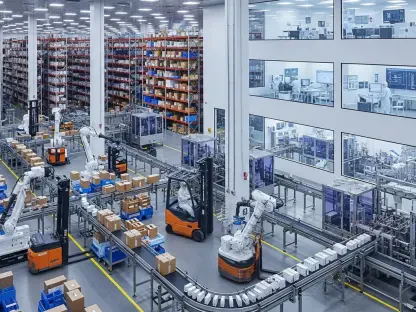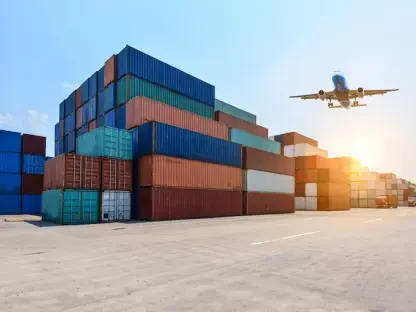The recent announcement of DEFCON AI’s successful acquisition of $44 million in seed funding marks a significant milestone in the realm of military logistics and technology. This substantial investment is directed towards expanding the company’s team, bolstering research and development efforts, and extending their advanced solutions aimed at promoting resilience in military logistics and mobility within contested and disrupted environments. This initiative is emblematic of the broader trend in leveraging advanced technologies to address the contemporary challenges faced by defense logistics, ensuring military preparedness and operational continuity in volatile and rapidly changing scenarios.
Transforming Military Logistics
Emphasizing Resilience in Operations
DEFCON AI’s core mission revolves around constructing robust logistical frameworks capable of supporting military operations, particularly emphasizing resilience in the face of potential disruptions. In today’s volatile geopolitical landscape, the ability to maintain adaptable and resilient supply chains is essential for the success of military endeavors. The recent funding injection is expected to significantly enhance DEFCON AI’s capacity to develop and implement these crucial systems.
The company’s focus aligns with a widely acknowledged view within the defense sector that modern military operations increasingly depend on logistical systems that can swiftly adapt to and recover from various disruptions. The underlying concept is to create a resilient backbone for military logistics that ensures continuous operational effectiveness even under adverse conditions. This approach not only maximizes readiness but also minimizes vulnerabilities, providing a comprehensive solution to the complexities of military supply chain management.
Bolstering Defense Sector Capabilities
Moreover, the advancements pioneered by DEFCON AI are set to substantially bolster the defense sector’s overall capability to maintain operational effectiveness, regardless of the circumstances. By integrating sophisticated technologies and innovative logistical strategies, DEFCON AI aims to provide military forces with the tools necessary to thrive in contested and disrupted environments. This forward-thinking strategy is essential for modern defense operations, which frequently encounter unpredictable challenges.
The investment in DEFCON AI can be seen as part of a larger trend within the defense industry, where there is an increasing focus on modernizing and enhancing military capabilities. This trend is underscored by significant defense sector deals, such as the Army’s TITAN production deal and Oshkosh Defense’s contract for more FHTV trucks. These initiatives reflect a strong and ongoing commitment to upgrading military assets in preparation for future operational demands. The emphasis on technological advancement and strategic planning highlights the defense sector’s dedication to staying ahead in an increasingly complex and dynamic global security environment.
Global Defense Initiatives
Notable Defense Contracts and Initiatives
The article further explores several notable contracts and initiatives within the defense industry, illustrating the broader trend of investment in enhancing military capabilities. For instance, the Army’s TITAN production deal, valued at $1.5 billion, signifies a major step towards modernizing reconnaissance and surveillance assets. Additionally, Oshkosh Defense’s $1.54 billion contract for more FHTV trucks indicates a significant upgrade in military logistics vehicles, aimed at improving the mobility and supply chain effectiveness of armed forces.
These contracts are part of a broader strategic effort to ensure that military forces are well-equipped and prepared to meet the challenges of modern warfare. The emphasis on securing new deals and partnerships highlights the importance of continuous investment in technological advancements and infrastructure projects within the defense sector. By modernizing their assets, military organizations aim to enhance their operational capabilities, ensuring they remain effective and adaptable in various scenarios, ranging from direct confrontations to logistical challenges in hostile environments.
International Collaboration for Enhanced Security
International cooperation also plays a pivotal role in these developments. The article mentions initiatives such as the SECNAV’s shipbuilding lobbying efforts in Denmark and NATO’s collaboration with Planet Labs, which involves using SkySat imagery to monitor global threats. These efforts underscore the necessity of global collaboration in addressing security challenges that transcend national borders, leveraging combined expertise and resources to enhance overall defense readiness.
By engaging in international partnerships, nations can share intelligence, technology, and best practices, creating a more robust and unified approach to global security. Such collaborations can lead to the development of innovative solutions and strategies, offering a collective defense mechanism against common threats. This interconnected approach not only strengthens individual national security but also fortifies global stability. The emphasis on international cooperation highlights the defense sector’s recognition of the interconnected nature of modern security challenges and the need for a cohesive, collaborative response to effectively address them.
Emerging Defense Technologies
Alternative Navigation Systems and Autonomous Submarines
Another key focus of the article is the integration of emerging technologies within the defense sector. For instance, the use of alternative navigation systems in C-17 aircraft represents a crucial advancement in mitigating navigational challenges that arise in contested environments. By exploring and implementing alternative navigation solutions, military forces can maintain operational effectiveness even in the face of potential disruptions to traditional navigation systems.
Additionally, the recent arrival of Australia’s Ghost Shark autonomous submarine in the U.S. for testing is highlighted as a significant development in unmanned underwater vehicles. These autonomous submarines represent a leap forward in naval capabilities, offering advanced surveillance, reconnaissance, and strategic operational functions without the need for onboard human presence. Such technologies not only enhance operational efficiency but also reduce the risk to human lives in high-stakes environments.
Strengthening Defense Through Technology
DEFCON AI’s recent announcement of securing $44 million in seed funding represents a significant development in military logistics and technology. This considerable financial boost will be used to expand the company’s workforce, enhance research and development, and further their advanced solutions aimed at ensuring resilience in military logistics and mobility, particularly in contested and disrupted environments. This move by DEFCON AI mirrors the larger trend of employing cutting-edge technologies to tackle modern defense logistics challenges, thereby ensuring military preparedness and operational continuity in unpredictable and rapidly evolving scenarios.
The new funds will allow DEFCON AI to attract top talent and develop innovative solutions that address the complex logistics needs of today’s military operations. In addition to bolstering their technological capabilities, the company aims to foster resilience, ensuring that military operations can continue effectively even in the face of significant disruptions. This initiative underscores the critical importance of advanced technologies, not only in enhancing logistical efficiency but also in maintaining operational stability under challenging conditions, a key priority for contemporary defense strategies.









